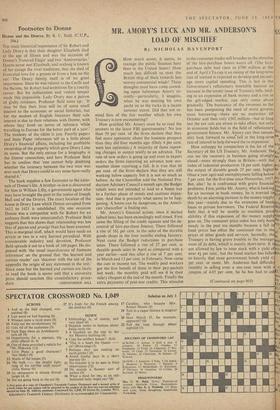Footnotes to Donne
THE main historical importance of Sir Robert and Lady Drury is that their daughter Elizabeth died at the age of fifteen and was the occasion of Donne's `Funerall Elegie' and two 'Anniversaries.' Donne never met Elizabeth, and nothing is known of her except the rival traditions, that she died of frustrated love for a groom or from a box on the car. The Drury family itself is of no great importance. Since he was related to the Cecils and the Bacons, Sir Robert had ambitions for a courtly career. But his indiscretion and violent temper made this impossible. Lady. Drury was a patron of godly ministers. Professor Bald sums up : 'It may be that their lives will be of some small interest to the economic or social historian, but for the student of English literature their sole interest is due to their relations with Donne, with whom they lived on terms of intimacy while travelling in Europe for the better part of a year.' The modesty of the claim is just. Family papers and State Paper references tell us a little about Drury's. financial affairs, including his profitable ownership of the property which gave Drury Lane its name. But the only excuse for a biography is the Donne connection, and here Professor Bald has to confess that 'one cannot help doubting whether the intimacy between the two men was ever such that .Drury could in any sense have really shared it.'
The book supplies a few footnotes to the exter- nals of Donne's life. A brother-in-law is discovered for him in William Lilly, a government agent who may have brought the poet to the notice of Joseph Hall and of the Drurys. The exact location of the house in Drury Lane which Donne occupied from 1612 to 1621 is established. On one occasion Donne was a competitor with Sir Robert for an embassy (both were unsuccessful). Professor Bald suggests that this shows their relationship was less that of patron and protege than has been assumed. This is marginal stuff, which would have made an article or two in a very learned periodical. With considerable industry and devotion, Professor Bald spreads it out to a book of 160 pages. He dis- pensed with 'the usual impedimenta of footnote references' on the ground that 'the learned and curious reader' can 'discover with the aid of the appendix the origin of any statement in the text.' Since none but the learned and curious are likely to read the book is seems odd that a university press should sanction this unsatisfactory proce- dure. CHRISTOPHER HILL






































 Previous page
Previous page